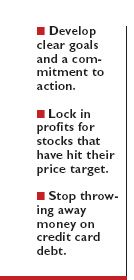Article
10 resolutions for 2006
Investment Consult

1. I will save more money. Maybe you say this every year, along with "I will exercise more and eat less." But now is the time to do it. It looks pretty clear that the stock market won't bring huge rewards in the next year or so. Steady saving may be the only route to a growing bank account. If you can't resist an expensive electronic toy or household luxury, save for it by opening a separate savings or investment account.
2. I will have more patience with my stocks. Don't re-evaluate your holdings every few months, and get antsy and sell if they don't rise. Judge each company over a few years, through market ups and downs, and in relation to changes in inflation rates and economic conditions. Stocks ultimately tend to revert to fair value-even if temporary situations artificially boost them or quash them, they're likely to return to what their intrinsic value should be. You need to wait it out unless something happens to dramatically change the stock's course-top executives have embezzled a majority of the company's assets, for example. Something like that would warrant a new, more skeptical look.
4. I won't fall in love with my winners. Very few stocks continue to climb forever. Your best strategy is to buy a stock with a target sell price in mind. If it hits that price, move on it, locking in the profit. Use the proceeds to buy another stock with strong potential. Stocks are like automobiles; they're meant to be bought and sold.
5. I will review my overall portfolio allocations right away. Sure, you probably look at your total returns to say, "Hooray!" or "Darn!" But when's the last time you checked your current allocations? Do small-cap stocks now make up, say, 35 percent of your assets, instead of the 15 percent you had originally planned? Refer to your original allocation goals, and see if your existing percentages are still in line. If one asset had a great run and is now dominating your portfolio, you face the risk that if the class plunges or goes to sleep, your portfolio will remain in a coma. Analyze your asset classes, or have your financial adviser do so. One helpful tool is the Morningstar Instant X-Ray at http://www.morningstar.com. The key to successful investing is to capture your gains and put them into an asset class that's likely to do well for you going forward.





